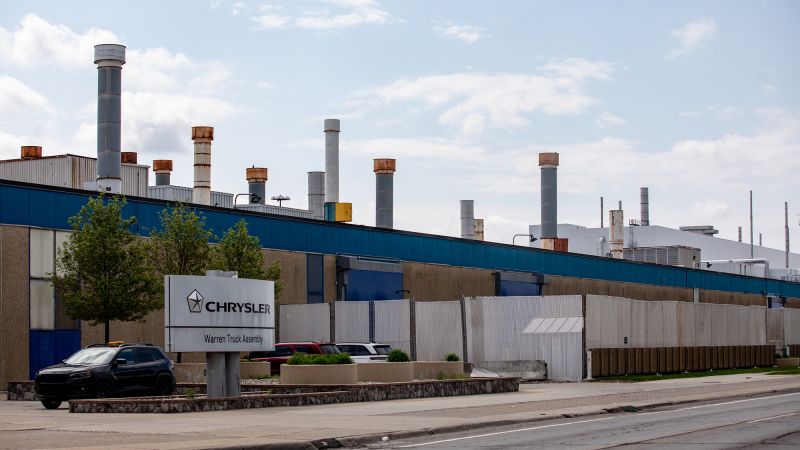CNN
—
Stellantis has “paused production” at some of its Canadian and Mexican auto assembly plants due to the newly announced tariffs — and as a result, some US workers will also be temporarily laid off.
Among those to be laid off are 900 US hourly employees who make powertrains and stampings that supply the affected Canadian and Mexican plants, Stellantis said Thursday. The temporary layoffs are due to reduced production prompted by the tariffs.
The affected US employees work at five different Midwest plants: the Warren Stamping and Sterling Stamping plants in Michigan, as well as the Indiana Transmission Plant, Kokomo Transmission Plant and Kokomo Casting Plant, all in Kokomo, Indiana.
Most of these workers at the five US plants will not immediately lose pay due to the terms of their union contract. But there would be a risk of lost pay, even with union protections, if the shutdowns at the Mexican and Canadian plants become prolonged.
Stellantis’s assembly plant in Windsor, Ontario — which produces the Chrysler Pacifica and Voyager as well as the Dodge Charger Daytona — will be closed for two weeks starting Monday. That plant employs 4,500 hourly workers.
Also starting Monday, Stellantis’s assembly plant in Toluca, Mexico, which makes the Jeep Compass and electric Wagoneer S, will be closed for the rest of April. The Toluca plant has 2,400 hourly workers.
In a memo to Stellantis’ North American employees, Stellantis’ chief operating officer for the Americas Antonio Filosa said the company is “continuing to assess the medium- and long-term effects of these tariffs on our operations, but also have decided to take some immediate actions.”
“These are actions that we do not take lightly, but they are necessary given the current market dynamics,” he added. “We understand that the current environment creates uncertainty. Be assured that we are very engaged with all of our key stakeholders, including top government leaders, unions, suppliers and dealers in the US, Canada, and Mexico, as we work to manage and adapt to these changes.”
United Auto Workers union president Sean Fain attacked the cuts by Stellantis.
“Stellantis continues to play games with workers’ lives,” he said in a statement. “These layoffs are a completely unnecessary choice that the company is making. It’s more of the same, and everything that’s wrong with our broken trade system. Companies like Stellantis use workers as collateral damage to pay the price for management’s poor decisions, and it’s unacceptable.”
Despite past criticism of President Trump, Fain and the union have strongly endorsed his tariff policy in the belief that auto production will be shifted back to US plants from Mexico and other countries. But any such shift would take at least months if not years to accomplish.
Unifor, the Canadian union that represents the autoworkers in the country, criticized Stellantis’s decision.
“Unifor warned that U.S. tariffs would hurt autoworkers almost immediately and in this case the layoffs were announced before the auto tariff even came into effect,” said Unifor President Lana Payne. “Trump is about to learn how interconnected the North American production system is the hard way, with autoworkers paying the price for that lesson.”

